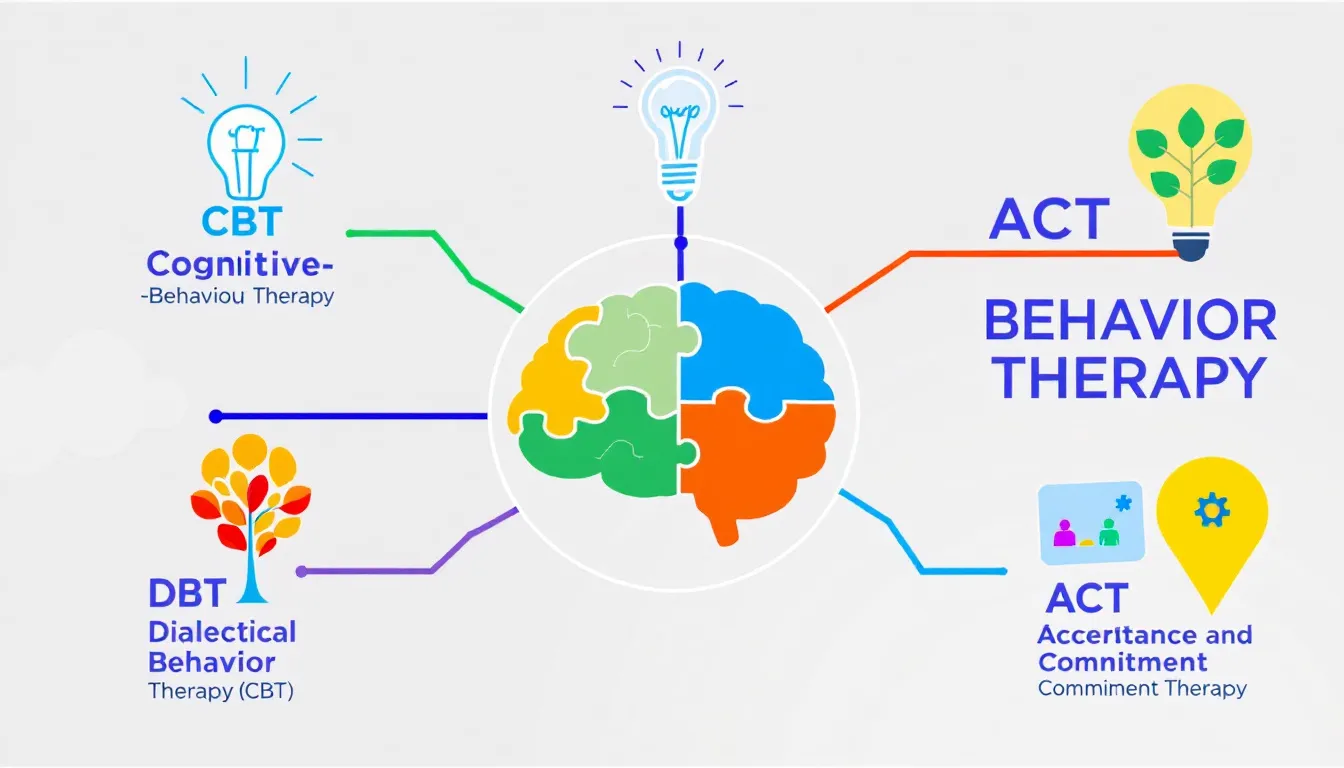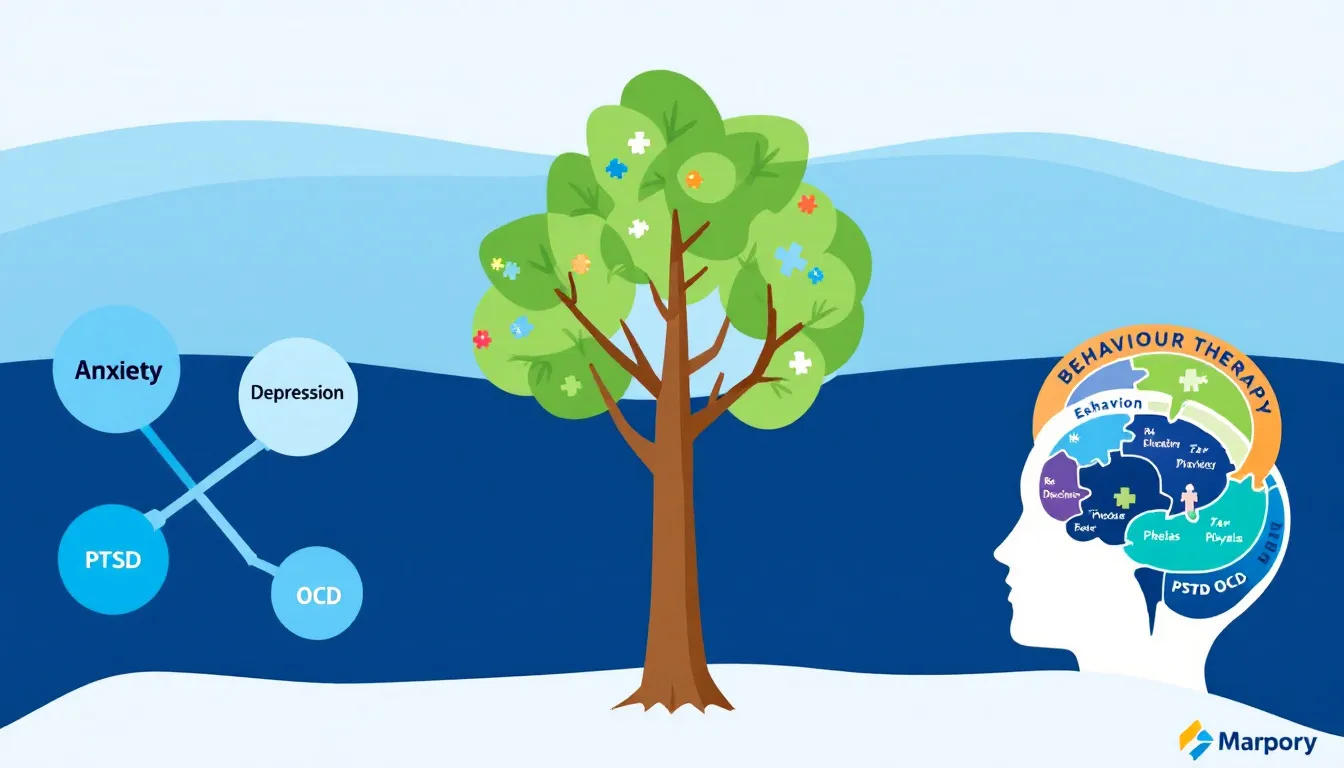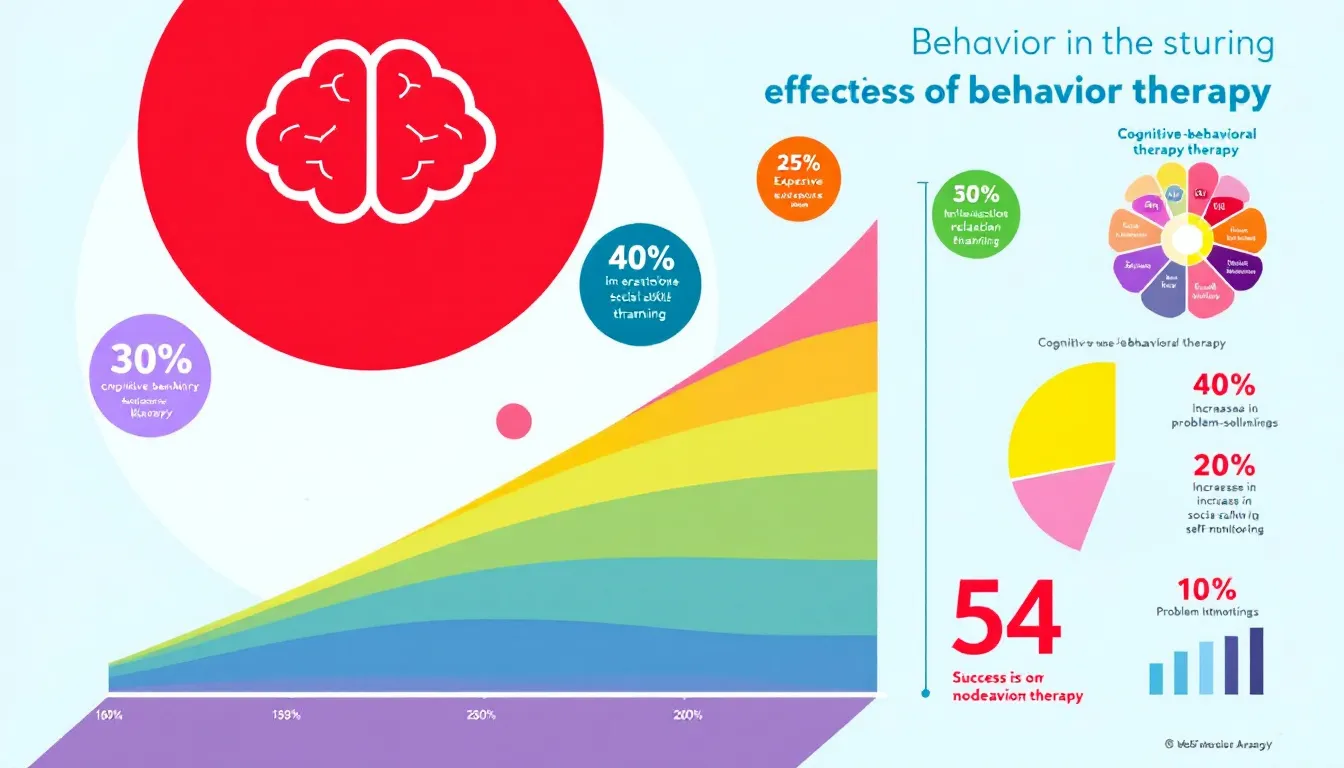
effective behaviour therapy: a guide to improving mental health
19 April, 2025
Behaviour therapy aims to change negative behaviours to improve mental health. This article will explain how behaviour therapy works, the techniques used, and the issues it can help address.
Key Takeaways
-
Behaviour therapy focuses on modifying learned behaviours through structured, present-oriented interventions, emphasising practical solutions over exploring past experiences.
-
Cognitive Behavioural Therapy (CBT) is a versatile and effective method used to treat a wide variety of mental health conditions, including anxiety and depression, often requiring only a short series of sessions for noticeable improvement.
-
While behaviour therapy, particularly CBT, offers quick results in behaviour modification, it has limitations, such as potentially overlooking underlying issues and requiring active client engagement for success.
Understanding Behaviour Therapy

Behaviour therapy is a potent method designed to transform maladaptive actions or responses that negatively impact an individual’s daily life and mental well-being. It operates on the principle that behaviours are acquired through environmental interactions, providing strategies for altering behaviour with systematic interventions. Behavioural therapy concentrates on current issues and delivers actionable remedies instead of exploring historical events, setting it apart from other therapeutic approaches. To boost its overall effectiveness, this form of therapy can be integrated with additional behavioural therapies.
The objective of behaviour therapy is to promote positive behaviours while diminishing unwanted ones, thereby improving mental health. Its emphasis on pragmatic solutions renders it particularly effective in treating various behavioural challenges.
Focusing more on proactive engagement rather than discourse, behaviour therapy employs distinct methods and techniques for individuals to alter their conduct effectively—making notable enhancements in everyday functioning. This practical methodology differentiates behavioural therapy from other types of counseling, establishing its importance for achieving substantial changes in behaviour.
Types of Behaviour Therapy

Behaviour therapy encompasses a variety of methods designed to alter behaviours that are considered unhelpful or harmful. Cognitive behavioural therapy (CBT) is particularly notable for its distinctive method and efficacy in addressing numerous mental health conditions. By integrating both cognitive and behavioural techniques, CBT assists people in recognising and transforming detrimental thoughts and actions.
The selection of a specific type of behaviour therapy hinges on the particular condition being treated as well as the intensity of symptoms experienced by an individual.
Techniques stemming from classical conditioning or operant conditioning provide different approaches through which individuals can reshape their behaviour, thereby enhancing their overall mental health.
Classical Conditioning Techniques
Through classical conditioning, behaviour is altered by developing connections between stimuli. This process pairs a previously neutral stimulus with one that naturally triggers a reaction, and through repeated associations, the once-neutral stimulus starts to independently provoke the same response. Such techniques are potent for changing behaviours.
Systematic desensitisation and similar approaches use this principle to help people incrementally face and reduce their fears by exposing them slowly to stimuli that cause anxiety or discomfort. These methods rooted in classical conditioning provide effective ways for individuals to reshape their behaviour, manage stress effectively, and enhance mental health.
Operant Conditioning Techniques
In behaviour therapy, operant conditioning is employed to alter behaviours through the use of reinforcement and punishment.
Employing methods like:
-
Reinforcement
-
Punishment
-
Shaping
-
Modeling
The aim is to promote beneficial behaviours while deterring actions that are counterproductive or carried out in detrimental manners. This targeted technique has been known to yield rapid and substantial results, contributing to its widespread popularity within the realm of behaviour therapy.
Common Techniques Used in Behaviour Therapy
Behaviour therapy utilises a range of tactics to change unwanted behaviours. Techniques such as reinforcement, shaping, and modeling are often employed to help people transform their behaviour patterns. These techniques are supplemented by educating patients, which helps them grasp and manage their own behaviours.
In addressing challenges related to mental health, cognitive behavioural therapy (CBT) offers effective self-help strategies. By prompting individuals to confront and change negative ways of thinking, CBT strives to promote more positive behaviours and enhance mental well-being overall.
Exposure Therapy
Through systematic exposure, exposure therapy assists people in progressively facing and reducing their fears. Its goal is to decrease the avoidance behaviours linked with these fears, empowering individuals to directly confront their anxieties. This technique has proven extremely effective for treating conditions such as social phobia and post-traumatic stress disorder (PTSD).
The approach includes strategies like imaginal exposure, which involves mental confrontation with fear stimuli. In vivo exposure that entails real-life interaction. And virtual reality exposure offering a simulated experience of the feared situations. Techniques like flooding rapidly expose individuals to fear-inducing stimuli to tackle fears head-on and discourage avoidance tactics.
Cognitive Restructuring
In therapy, cognitive restructuring is a process that converts unhelpful thinking patterns into positive ones. This technique involves recognising and disputing cognitive distortions to substitute detrimental thoughts with beneficial alternatives. It’s an essential element of both cognitive behavioural therapy (CBT) and cognitive therapy, aiding people in comprehending how their thought processes influence their actions.
By collaborating with a mental health professional, individuals can develop the ability to identify and modify negative self-talk, which greatly enhances their mental well-being and tackles various mental health issues, even those related to severe mental illness. This method is especially potent for managing psychological problems accompanied by negative emotions.
Behavioural Activation
Behavioural activation is a therapeutic approach that encourages individuals to participate in enjoyable activities as a means of reducing symptoms associated with depression. By engaging more frequently in rewarding and significant actions, it aims to combat depressive states and improve one’s general state of well-being. This method assists in pinpointing pursuits that provide fulfillment and pleasure, thereby serving as an effective tactic for the betterment of mental health.
Within the realm of clinical practice, behavioural activation motivates patients to re-engage with tasks they may have abandoned due to severe depression. It effectively disrupts the interconnected pattern of negative emotions and lackluster behaviour, which fosters improved outcomes for mental health wellness.
Conditions Treated with Behaviour Therapy

Cognitive behavioural therapy (CBT) is an effective treatment for a broad spectrum of mental health conditions, notably anxiety disorders and depression. Research indicates that CBT substantially lessens the symptoms associated with these conditions, leading to its widespread use as a preferred therapeutic modality.
When it comes to obsessive-compulsive disorder (OCD), CBT has been shown to yield significant improvement in numerous instances. Programs designed specifically for OCD, such as ‘OCD? Not Me!’, are endorsed as potent treatment alternatives for adolescents suffering from this condition. CBT extends its utility by tackling issues related to anger and stress management, thus offering a holistic solution for mental health challenges.
To those mentioned above, the applicability of cognitive behavioural therapy spans various other psychological disturbances including:
-
Post-traumatic Stress Disorder (PTSD)
-
Panic disorder
-
Phobias
-
Chronic issues like bulimia nervosa and diverse eating disorders
The adaptability and proven success rate of cognitive behavioural therapy establish it as an invaluable tool in addressing an array of psychological problems within therapeutic contexts.
Benefits of Behaviour Therapy

Behaviour therapy is renowned for its quick efficacy in modifying behaviours. By aiding people in managing diverse scenarios and bolstering self-awareness, cognitive behavioural therapy (CBT) promotes better mental health.
Clients might expect to attend between five and 20 sessions of CBT before observing substantial improvements. This positions CBT as an effective treatment choice within a relatively short timeframe. Behaviour therapy provides practical strategies through a systematic methodology that arms individuals with the necessary skills for enduring behavioural alterations. The precise number of required sessions can fluctuate depending on each individual’s progression.
Effectiveness of Behaviour Therapy

Behavioural therapy, particularly cognitive behavioural therapy (CBT), is well-supported by research, with 269 meta-analytic studies confirming its effectiveness across a variety of psychological issues. It boasts an impressive success rate: around two-thirds of those who undergo psychotherapy report notable improvements, showcasing the substantial impact CBT can have. Depending on the specific disorder being treated, response rates to CBT can vary considerably from 38% to 82%.
When it comes to substance abuse disorders, the efficacy of CBT is influenced by the particular substance involved. Although beneficial in addressing symptoms associated with schisophrenia, this form of treatment doesn’t consistently lead to better outcomes regarding relapses and subsequent hospitalisations.
Advancements within behavioural therapy are enhancing its utility for mental health treatment. One such example includes coupling mental imagery techniques with traditional cognitive behavioural methods. These innovations demonstrate considerable promise for treating conditions related to social skills anxiety disorder and continue improving the overall potency and application range of behaviour therapies like CBT.
Limitations and Considerations
Despite its benefits, cognitive behavioural therapy (CBT) has limitations. Critics argue that CBT focuses on symptoms rather than addressing underlying causes of mental health conditions. CBT may not be effective for individuals with brain injuries or diseases affecting rational thinking.
Active participation is crucial for CBT’s success; lack of engagement can lead to disappointing results. Establishing professional trust between therapist and client is essential for effective CBT. Though CBT is designed as a brief therapy, overcoming negative thought patterns may require more time.
Individuals seeking a fast solution may find CBT unsatisfactory as genuine change demands time and effort. An integrated treatment approach is needed to effectively address complex mental health conditions.
Getting Started with Behaviour Therapy
Selecting an appropriate therapist is a critical aspect of effective behaviour therapy. To assist in this process, the Australian Psychological Society has developed an online search tool that allows individuals to locate psychologists in their area who cater to particular concerns.
An initial discussion with a potential therapist can shed light on their personal style and methodological approach before making any commitments.
Should you experience discomfort with your therapist after attending a session, it’s entirely permissible to look for another professional. The quality of the relationship between you and your therapist plays a vital role in determining the overall efficacy of the therapy sessions.
Summary
Behaviour therapy offers practical and effective strategies for modifying behaviour and improving mental health. From understanding the principles of behaviour therapy to exploring its various techniques, this guide has provided a comprehensive overview of how behaviour therapy can help address a wide range of mental health conditions.
By considering the benefits, effectiveness, and limitations of behaviour therapy, individuals can make informed decisions about their mental health treatment. Whether you’re dealing with anxiety, depression, or other psychological problems, behaviour therapy offers a valuable resource for achieving better mental health.
Frequently Asked Questions
What is behaviour therapy?
Behaviour therapy is a practical therapeutic approach that aims to change negative actions or reactions impacting a person’s daily life and mental well-being. By focusing on actionable solutions, it helps individuals achieve better mental health outcomes.
What conditions can behaviour therapy treat?
Behaviour therapy effectively treats various conditions, particularly anxiety disorders, depression, OCD, and PTSD. It provides structured techniques to help individuals manage and overcome these challenges.
How effective is cognitive behavioural therapy (CBT)?
Cognitive Behavioural Therapy (CBT) is highly effective, with response rates between 38% and 82% depending on the specific condition.
Its utility in treating various mental health issues underscores its value in therapeutic practices.
What are some common techniques used in behaviour therapy?
Common techniques in behaviour therapy include exposure therapy, cognitive restructuring, and behavioural activation, all aimed at modifying maladaptive behaviours and thought patterns.
These methods effectively promote positive change and improved mental well-being.
How do I find the right therapist for behaviour therapy?
To find the right therapist for behaviour therapy, utilise online tools to search for psychologists by location and specialty, and engage in preliminary conversations with potential therapists to gauge compatibility.
.svg)

















